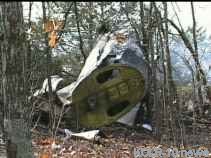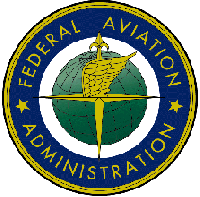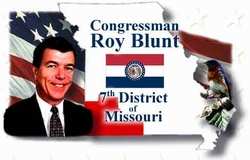Additional NTSB, OIG Correspondence Released
We ran a chilling story last week, about CFI
Joe Brinell, 54, who, along with his companions in a Citation, were
killed in a landing accident in December, 1999. At that time, we
thought it was clear, from recently-released material held by Cong.
Roy Blunt (R-MO), that Brinell had been overly harassed by the FAA.
Here are additional findings, released by Blunt's office, that come
directly from the government offices of the DoT's Inspector
General.
 NTSB's Findings:
NTSB's Findings:
The National Transportation Safety Board (NTSB), in its June
2001 Accident Investigation Report, concluded that the crash
resulted from pilot error under adverse weather conditions. The
NTSB report included the following narrative based on an interview
its accident investigator conducted:
"A corporate operator and friend of the pilot [Mr. Brinell] said
that he met the pilot [on December 9, 1999] after the pilot's
airplane landed at St. Louis . . . [Mr. Brinell] said, 'I need to
talk to you.' . . . He said that [Mr. Brinell] told him that he
hadn't slept for three days, and expressed that a supervisor in the
Kansas City FSDO 'is trying to destroy me.'"
FAA's Internal Investigation
By letter dated February 25, 2000, you [Blunt] requested FAA to
investigate allegations you received from Mr. Brinell's widow,
Grace Brinell, that the Kansas City FSDO had wrongfully targeted
Mr. Brinell for regulatory enforcement. FAA subsequently convened a
team of three Aviation Safety Inspectors from within its Central
Region to conduct an internal investigation. FAA reported its
findings to you by correspondence signed by the Deputy Associate
Administrator for Regulation and Certification, dated July 3, 2000,
and October 10, 2000.
Significantly, among its investigative findings, FAA concluded
that the FSDO's May 1999 attempted formal re-examination of Mr.
Brinell's pilot competency, which could have led to revocation of
his Airline Transport Pilot certificate, was not warranted.
However, FAA further found, as reported to you in its October 10,
2000, letter, that the FSDO was 'not remiss in its oversight
responsibilities or abusive in exercising its empowerment to
re-examine Mr. Brinell, and the actions taken by the FSDO
[Supervisor] were appropriate.'
OIG's Review of FAA's Investigation

Based on your concerns about the adequacy of FAA's internal
investigation, you subsequently requested that we examine its
thoroughness and accuracy, and we (The NTSB) cited as its
investigative findings the following: (1) Proper altitude - not
maintained - pilot in command; (2) Fatigue (lack of sleep) - pilot
in command; (3) Weather condition - low ceiling; (4) Use of
inappropriate medication/drug - pilot in command; (5) Weather
condition - rain; and (6) Pressure induced by others - FAA
inspector.
Regarding finding #4, per NTSB's report, Mr. Brinell had been
taking a commonly prescribed medication known as Sinequan, which
reportedly may cause drowsiness.
Report No. CC-2001-221
 Reported our findings to you by
letter dated December 4, 2001. We identified a number of troubling
irregularities, the most significant of which was an
evident lack of objectivity and an
underlying bias in favor of FSDO personnel,
against whom the allegations were made, thereby compromising the
integrity of FAA's investigation.
Reported our findings to you by
letter dated December 4, 2001. We identified a number of troubling
irregularities, the most significant of which was an
evident lack of objectivity and an
underlying bias in favor of FSDO personnel,
against whom the allegations were made, thereby compromising the
integrity of FAA's investigation.
Specifically, we found that one of the team members, at the
outset of the investigation, told the team that they had
'reputations to protect.' We were also told that the team
leader advised the team to consider that FSDO personnel subject to
the allegations had applied for promotions. Further, we found
serious omissions from FAA's Report of Investigation, including a
dissenting report prepared by a member of FAA's investigative team
that highlighted deficiencies in FAA's investigation. These
omissions gave rise to the perception of bias in
FAA's internal investigation.
We also found that remedial action pledged by the FAA in its
correspondence to you concerning FSDO personnel assignment changes
was ambiguous in terms of what action FAA intended to take, and
that specific action directed by management was not adhered to. For
instance, despite assurances to you that specific inspectors would
no longer be assigned duties at the College, one of these
individuals who had pursued enforcement-related actions against Mr.
Brinell was seen by Mrs. Brinell at the College, sitting at her
late husband's desk with his feet on top of the desk.
Based on our findings, we advised you that it was appropriate
for our office to re-investigate the underlying alleged FSDO
improprieties concerning FAA's oversight of Mr. Brinell and the
College of the Ozarks. This letter presents the results of our
follow-on investigation. We would be pleased to brief you and your
staff on our investigation.
The FSDO General Aviation Supervisor was
promoted to the position of FSDO Manager while FAA
conducted its internal investigation. Currently, this individual is
the Acting Assistant Regional Flight Standards Division Manager. To
date, a permanent selection for that position has not been
made.
Report No. CC-2001-221
 OIG's Investigation of Alleged
Harassment by the FSDO
OIG's Investigation of Alleged
Harassment by the FSDO
Summary of Findings
We found that between March 1999 and the crash in December 1999,
the FSDO's General Aviation Supervisor and a Principal
Operations Inspector took a series of three enforcement-related
actions against Mr. Brinell, each of which posed a threat to his
livelihood in commercial aviation.
These actions were (a) an attempt to strip Mr. Brinell of his
pilot examiner status; (b) a directed re-examination of his pilot
proficiency, potentially resulting in the revocation of his
transport pilot's license; and (c) direction for him to turn-in to
the FSDO all of his logbooks, documenting his history as a pilot,
as part of an investigation into alleged unauthorized check-rides
given by Mr. Brinell.
In reviewing these actions, we found that they were unwarranted
and the FSDO's justification lacked credibility. The following
summarizes our findings for each of these actions, along with
a troubling inconsistency in FAA.s October 10, 2000, correspondence
to you:
- In March 1999, the Supervisor and Operations Inspector
inappropriately attempted to relieve Mr. Brinell of his Designated
Pilot Examiner authorization based on an undocumented belief that
he had been a poor representative of the FAA...
- Directed Re-examination of Mr. Brinell.s Pilot Competency In
May 1999, the Supervisor and Principal Operations Inspector
wrongfully directed Mr. Brinell to submit to a re-examination of
his pilot competency for reasons not relevant to his status as a
pilot...
- Both the Inspector and Supervisor stated that their actual
intent in directing the re-examination was to get Mr. Brinell's
attention...
- The Supervisor and Operations Inspector continued to pursue
re-examination of Mr. Brinell, even after an FAA Regional attorney
counseled the Supervisor against it... ...we found the actions of
the Supervisor and Operations Inspector to be inconsistent with
policy guidance restricting re-examinations prescribed in FAA.s
Inspector's Handbook.
- Additionally, we found indicia of disparate treatment of Mr.
Brinell, in that FSDO records reflect that no other pilots were
subjected to re-examination of their pilot competency for
maintenance-related violations unless they were found to have
operated an aircraft at the time violations occurred.
- Moreover, while the FSDO Supervisor targeted Mr. Brinell's
pilot competency based on his position of overall responsibility
for the College's aviation program, he did not pursue
re-examination of the College's Director of Maintenance, relative
to his mechanic's certificate. We question the Supervisor's
rationale, albeit flawed.
- For attempting to hold Mr. Brinell personally accountable, when
the Director of Maintenance had day-to-day responsibility for the
College's aircraft maintenance program and thus was in a more
direct position to take corrective action.
- ...We found the Supervisor.s explanation for requiring Mr.
Brinell.s logbooks to lack credibility, and other circumstances of
this action questionable. Moreover, the prior inappropriate conduct
of the Supervisor and Inspector, in targeting Mr. Brinell for
enforcement actions, taints its legitimacy.
- ...The Inspector told us while he did have a telephone
conversation with Mr. Brinell, he did not recall what they
discussed, but said he would not have given verbal approval.
However, the Inspector acknowledged having given other pilots such
authorization in the past...
- Finally, we found a troubling inconsistency reported to you in
FAA's October 10, 2000, letter signed by the Deputy Associate
Administrator for Regulation and Certification. While the letter
stated that the FSDO's directed re-examination of Mr. Brinell was
not warranted, it qualified that finding by asserting that the FSDO
had not been remiss and the actions of the FSDO Supervisor in
pursuing the re-examination were appropriate.
- Based on our findings, these statements are inherently
inconsistent and should not have been reported to you. During the
course of both our initial and subsequent investigations, we found
no support for FAA's conclusion that the actions of the FSDO were
appropriate.
 We are transmitting our
full Report of Investigation, including all interview transcripts,
to the FAA Administrator, along with the following
recommendations:
We are transmitting our
full Report of Investigation, including all interview transcripts,
to the FAA Administrator, along with the following
recommendations:
1. That FAA consider appropriate disciplinary and other
administrative action against the FSDO Supervisor and Operations
Inspector based on their culpability in this matter. Due to the
gravity of our investigative results, we question the Supervisor.s
suitability to serve as the FSDO Manager, the permanent position to
which he was promoted while FAA.s internal investigation was
ongoing. We also recommend that FAA consider terminating the
Supervisor's present assignment as Acting Assistant Regional Flight
Standards Manager.
The FAA was previously apprised of our initial investigative
findings, including the promotion of the FSDO Supervisor to FSDO
Manager during the conduct of FAA's internal investigation, and
agreed to hold any future promotions in abeyance pending the
results of our follow-on investigation.
2. That the FAA Administrator correspond to you, as well as to
Mrs. Brinell, regarding actions taken pursuant to our investigative
findings and recommendations. It is our position that, to date, you
and Mrs. Brinell have not been provided with an adequate,
straightforward response from FAA.
3. That FAA apply the results of this investigation in
reinforcing with its Flight Standards inspection workforce the
appropriate protocols and criteria for such enforcement-related
actions as re-examination of certificate holders and directing
pilots to submit their logbooks to FSDOs.
4. That FAA take steps to ensure that the Kansas City FSDO,
along with other FSDOs, follow prescribed record retention
procedures. We find it troubling that the FSDO had no record of Mr.
Brinell.s 1995 Letter of Authorization for the Cessna 310.
 We note that this is the third
investigation we have conducted over the last three years involving
fatal general aviation accidents and alleged improprieties on the
part of FSDOs. In the two prior cases, both of which were
requested by Members of Congress, we found FSDO personnel to have
been remiss in performing their regulatory oversight functions.
We note that this is the third
investigation we have conducted over the last three years involving
fatal general aviation accidents and alleged improprieties on the
part of FSDOs. In the two prior cases, both of which were
requested by Members of Congress, we found FSDO personnel to have
been remiss in performing their regulatory oversight functions.
In one case, in FAA's Eastern Region, the then-Regional Flight
Standards Manager and his then-Assistant Manager took significant
disciplinary and other administrative action pursuant to our
findings and recommendations. These executives, who now serve
in the capacity of Associate Administrator for Regulation and
Certification, and Director of Flight Standards, respectively, were
not in their current positions at the time of FAA.s October 10,
2000, correspondence to you.
We recently discussed this investigation with them and they
consider our results to be of a serious nature. They expressed a
strong commitment to personally review our investigative results
and take appropriate action. Separately, we will be providing the
complete report of investigation on this matter to the FAA
Administrator. We have asked them to inform us, within 30 days, of
action they intend to take and this will be reported to you in a
timely manner.
Sincerely, Kenneth M. Mead, Inspector General
 Aero-News: Quote of the Day (11.02.25)
Aero-News: Quote of the Day (11.02.25) ANN's Daily Aero-Term (11.02.25): Inner-Approach OFZ
ANN's Daily Aero-Term (11.02.25): Inner-Approach OFZ Classic Aero-TV: MultiGP Drone Racing - Aviations New Action Sport
Classic Aero-TV: MultiGP Drone Racing - Aviations New Action Sport ANN's Daily Aero-Term (11.03.25): On-Course Indication
ANN's Daily Aero-Term (11.03.25): On-Course Indication Airborne 10.29.25: X-59 Flies!!!, Kings Aid CFIs, Shutdown Hurts ATC Training
Airborne 10.29.25: X-59 Flies!!!, Kings Aid CFIs, Shutdown Hurts ATC Training







